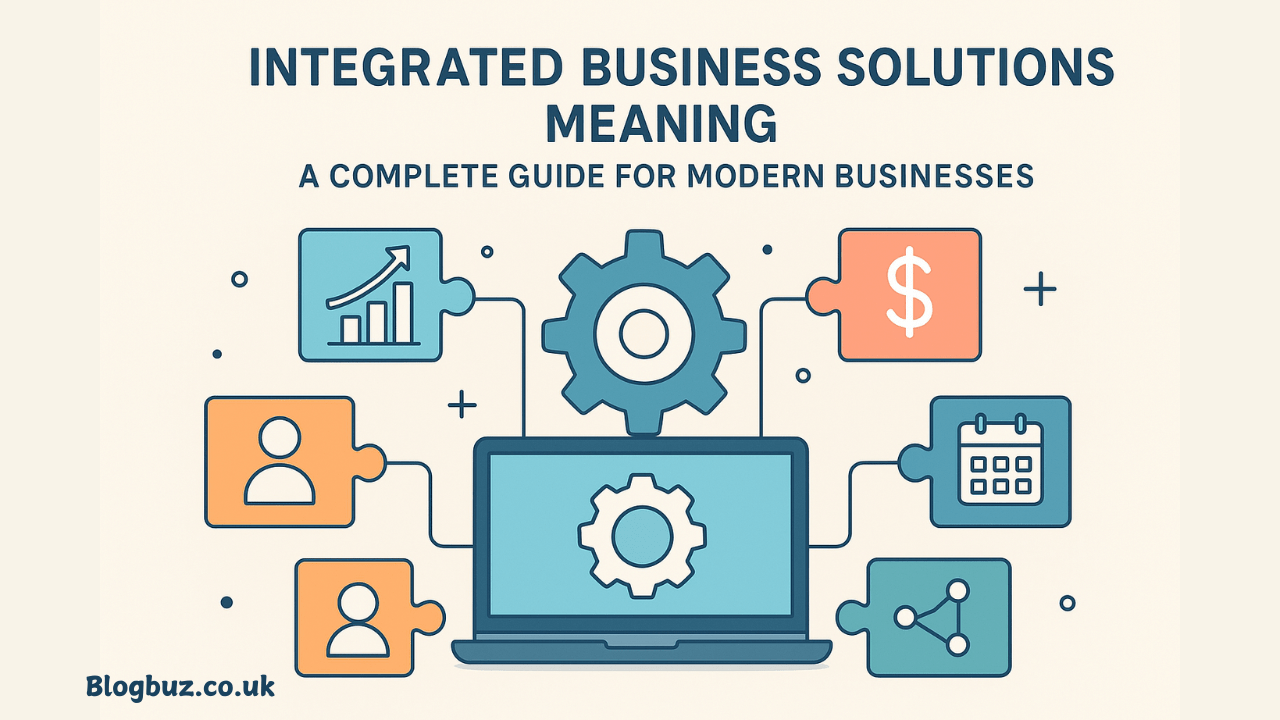Integrated Business Solutions Meaning: A Complete Guide for Modern Businesses

In today’s digital economy, efficiency and collaboration are critical for success. Businesses across industries seek to eliminate silos, streamline communication, and gain real-time insights into performance. This is where understanding integrated business solutions meaning becomes essential. Integrated business solutions (IBS) refer to the practice of unifying multiple business functions—such as finance, sales, human resources, supply chain, and customer service—into a single, coordinated system. Instead of working in isolated departments with separate software, businesses using integrated systems experience synchronized operations, improved data accuracy, and enhanced decision-making capabilities. Let’s explore in detail what integrated business solutions entail, how they work, their advantages, and why they have become indispensable for modern organizations.
What Is the Meaning of Integrated Business Solutions?
The meaning of integrated business solutions lies in the seamless connection between different processes and technologies that power an organization. It involves combining tools, databases, and workflows into a cohesive ecosystem rather than treating them as independent units.
For example, an integrated system might connect an ERP (Enterprise Resource Planning) platform with a CRM (Customer Relationship Management) tool and inventory software. This integration ensures that when a sale occurs, the financial records, inventory count, and customer profiles automatically update without manual intervention.
In simple terms, integrated business solutions enable data to flow freely across departments, fostering transparency and collaboration.
The Core Components of Integrated Business Solutions
To understand integrated business solutions meaning, it’s essential to examine its key components. Typically, an IBS framework includes several interconnected modules:
Enterprise Resource Planning (ERP)
ERP software acts as the backbone of integration. It consolidates essential processes—finance, accounting, procurement, and production — into a unified system. With ERP, businesses can automate repetitive tasks and maintain data consistency.
Customer Relationship Management (CRM)
A CRM module manages all customer interactions, from sales inquiries to after-sales support. When integrated with an ERP system, it ensures that every department has access to accurate customer information.
Human Resources (HR) and Payroll Systems
Integrated HR systems help manage recruitment, employee records, attendance, and payroll seamlessly. The HR department can align workforce planning with business performance goals.
Supply Chain and Inventory Management
This component tracks the movement of goods, procurement activities, and inventory levels in real-time. Integration enables the supply chain team to coordinate directly with finance and operations.
Business Intelligence and Analytics
Analytics tools transform raw data into insights. An integrated business solution centralizes this data, helping leaders make evidence-based decisions.
Integration Middleware and APIs
These technologies act as connectors that ensure different software systems communicate effectively. Middleware bridges the gap between legacy and modern systems.
By merging these components, companies achieve a centralized digital ecosystem, the essence of integrated business solutions meaning.
Why Businesses Need Integrated Business Solutions
The growing complexity of business operations drives the demand for integration. Modern companies deal with huge volumes of data, remote teams, and multiple software platforms. Managing them separately often leads to inefficiencies, miscommunication, and data duplication.
Here’s why adopting integrated business solutions has become a necessity:
- Efficiency and Productivity:
- Automation reduces manual work and eliminates redundant processes.
- Data Accuracy:
- Shared databases ensure that all departments use consistent, real-time data.
- Better Decision-Making:
- With integrated analytics, businesses can forecast trends, manage risks, and seize opportunities.
- Cost-Effectiveness:
- Over time, integrated systems cut costs by reducing errors, maintenance needs, and software redundancy.
- Enhanced Customer Experience:
- When customer data is accessible company-wide, support and marketing become faster and more personalized.
- Scalability and Growth:
- Businesses can easily expand by adding new modules without having to start from scratch.
- Regulatory Compliance:
- Centralized systems simplify audits, reporting, and data protection compliance.
Understanding integrated business solutions meaning isn’t just a matter of technology—it’s about transforming business models for sustainable growth.
Advantages of Integrated Business Solutions
Streamlined Communication
Integration connects departments that traditionally worked in isolation. Sales teams can instantly access finance data, while HR can align hiring plans with production goals.
Improved Operational Visibility
With real-time dashboards, managers can monitor performance metrics, supply chains, and customer behavior at a glance.
Enhanced Collaboration
Shared access to data fosters collaboration among teams, enabling innovative problem-solving and faster decision-making.
Reduced Human Error
Automated workflows significantly minimize the risk of data entry mistakes or misreporting.
Faster Response to Market Changes
Businesses can adapt quickly when new trends or challenges arise because integrated data provides immediate insights.
Long-Term Financial Savings
Although the initial investment in integrated systems can be high, the long-term benefits in efficiency and reduced maintenance outweigh the costs.
Challenges in Implementing Integrated Business Solutions
While the integrated business solutions meaning emphasizes efficiency and unity, implementation comes with its own set of challenges:
- High Initial Cost: Deploying ERP and CRM systems often requires a significant financial investment.
- Complex Integration: Legacy systems may not be readily compatible with modern platforms.
- Change Resistance: Employees accustomed to traditional workflows may resist adopting new systems.
- Training Requirements: Proper user training is vital to maximizing the system’s potential.
- Security and Data Privacy: Centralized systems require robust cybersecurity measures to prevent data breaches.
Addressing these challenges requires strategic planning, choosing the right vendor, and involving all stakeholders during the implementation phase.
Real-World Examples of Integrated Business Solutions
- Retail Industry:
- Large retail chains integrate sales, inventory, and accounting systems. When an item is sold, the system automatically updates inventory levels, generates invoices, and notifies the purchasing team for restocking.
- Manufacturing Companies:
- Integration between ERP and supply chain tools helps manufacturers track raw materials, production schedules, and delivery timelines.
- E-Commerce Businesses:
- Online retailers combine CRM and logistics software to offer personalized recommendations and accurate delivery tracking.
- Healthcare Sector:
- Hospitals use integrated systems to manage patient records, billing, inventory, and appointments in one place.
These examples illustrate how understanding integrated business solutions meaning leads to tangible, measurable improvements in operations.
Future Trends in Integrated Business Solutions
The future of integrated business solutions is being shaped by emerging technologies such as:
- Artificial Intelligence (AI): Predictive analytics and automation will enhance operational intelligence.
- Cloud Computing: Cloud-based integrations offer flexibility, cost-efficiency, and accessibility from anywhere.
- Internet of Things (IoT): Real-time monitoring of devices and assets will become a part of business integration.
- Blockchain: Ensures secure and transparent transactions across departments.
- Low-Code Platforms: Simplify integration and customization of business software.
Companies that leverage these innovations will gain a competitive edge through more intelligent, data-driven strategies.
Conclusion: Understanding Integrated Business Solutions Meaning in Today’s Context
The integrated business solutions meaning goes beyond connecting software systems—it represents a holistic approach to running a business efficiently. By integrating multiple departments and technologies, organizations can streamline operations, enhance collaboration, and make smarter decisions based on unified data.
You May Also Read: Christophersystems.org: Your Next-Gen Partner for IT Solutions & Digital Transformation




